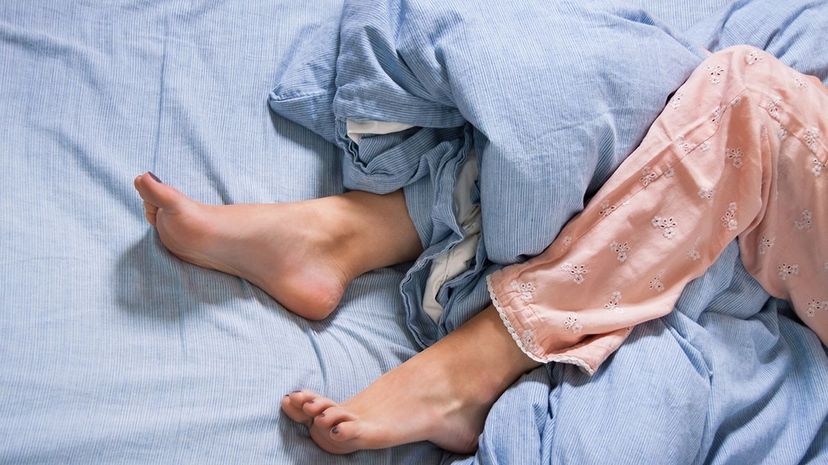 “Weighted blankets are about 3 to 25 pounds (1 to 11 kilograms) and are designed to essentially smother the muscles into relaxing. Yulia-Images/iStock/Thinkstock
“Weighted blankets are about 3 to 25 pounds (1 to 11 kilograms) and are designed to essentially smother the muscles into relaxing. Yulia-Images/iStock/Thinkstock
Not all of us want a hug when we’re stressed out. Some people, particularly those with sensory processing problems, do want a hug, but might be uncomfortable getting it from a person. Temple Grandin, an animal scientist and autism activist, had a solution.
Grandin invented a "squeeze machine" that helped relax some children with autism and attention deficit hyperactivity disorder (ADHD). Autism affects the ability to interact and communicate, and ADHD is a mental disorder that impairs impulse control and ability to focus. Some autistic children seek physical pressure to cope with overstimulation. The idea behind Grandin’s invention is that deep-touch pressure, like cuddling, firm stroking or hugging, can be calming. Could adults without autism benefit from the same reactions to physical pressure as autistic children?
Some industrious folks think so. Companies like ZonLi and Gravity Blankets have introduced weighted (or "gravity") blankets that weigh about 3 to 25 pounds (1 to 11 kilograms) and are designed to stimulate the sympathetic nervous system into its resting state (a feeling of being hugged) as opposed to the "fight or flight" feelings that keep us alert to danger but also up when we really should be sleeping.
But what’s the evidence that these blankets, like other sleep technology, alleviate ailments like anxiety, insomnia, stress and a whole host of other conditions might benefit from deep-touch pressure?
What’s a weighted blanket used for?
One 2015 Swedish study found that a weighted blanket improved insomniacs’ sleep time and experience. (Note, the study was supported by a grant from a manufacturer of weighted blankets.) In another study, researchers determined that adults were calmed by weighted blankets, with 63 percent of the 32 participants reporting lower anxiety after using one. Since deep-touch pressure is reported to lower high heart rates and cortisol levels while increasing serotonin (a neurotransmitter that maintains mood balance), it makes sense that gravity blankets could help moderate the nervous system. That could mean relief at a time when about 25 percent of Americans develop insomnia every year.
"Insomnia is very, very common. Getting to sleep is like a puzzle, involving pieces like light, temperature, and the ‘snuggle effect,’ which is like a hug," says Dr. Raj Dasgupta, an assistant professor of clinical medicine at the University of Southern California. He notes that for some people, perhaps those struggling with anxiety or depression, the blanket could be one of the missing puzzle pieces. There’s a lot of evidence that the "snuggle effect" helps people with issues related to ADD, ADHD, and autism, he says. And because the blankets may apply pressure to trigger points in the body, they may also aid those who deal with chronic pain, even in the case of fibromyalgia.
Dasgupta stresses that sleep is so individualized that it’s hard to make broad statements about any sleep-related product. But he absolutely would recommend these blankets before starting someone on prescription sleep medications.
One of the downsides of these blankets, he says, is that they’re expensive (ranging from $50 to $300). Another is that small children or pets could become trapped under the blanket’s heft.
Do weighted blankets help with anxiety?
It’s worth noting that, when it comes to anxiety and its related treatments, the placebo effect might well be rearing its head. Dasgupta points out that objective, research-backed evidence is going to be hard to create in a lab setting, because, test subjects would obviously know from the weight of the blankets that they were part of the test group or the control group. So, while some might find a heavy blanket comforting and soothing, others might find it a $300 way to feel like they’re being smothered.
Now That’s Interesting
Wondering what adds weight to the gravity blankets? No, it’s not thousands of sleeping pills. The manufacturers generally use polypropylene pellets. Poly pellets are hard, little plastic balls that you might find in, say, stuffed animals.


